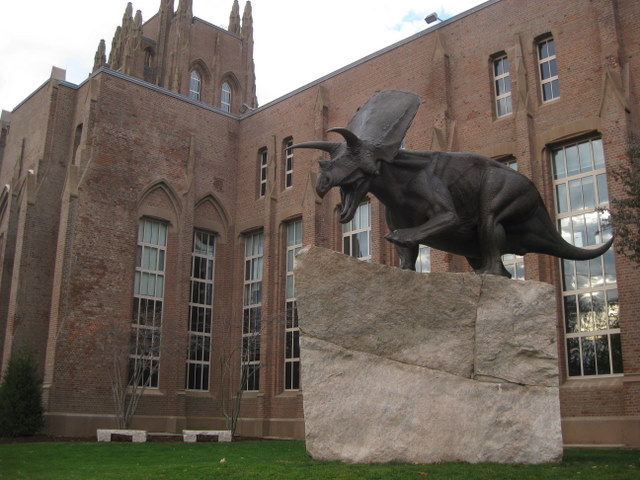
Wikimedia Commons
In a full lecture hall in Kline Geology Laboratory Tuesday night, Jonathan Losos, Harvard professor of organismic and evolutionary biology, discussed the evolution of the human race and whether or not it was predestined. His lecture was the second in the John H. Ostrom Lecture Series, an annual series specialized this year to mark the 150th anniversary of the Yale Peabody Museum of Natural History.
Director of the Peabody David Skelly called Losos, a noted evolutionary biologist specializing in the Anolis lizard, “one of the leading lights in the world of evolutionary ecology.” Losos’ lecture began with the trailer from last year’s Disney-Pixar movie “The Good Dinosaur,” which was about the friendship between a human boy and a dinosaur. Losos posited the question of what Earth would be like had the dinosaurs not gone extinct. In “The Good Dinosaur,” humans evolve alongside living dinosaurs, but in his lecture, Losos disagreed with that possibility. Losos asserted, to nearly 100 attendees, that humans would not exist as they do today if dinosaurs still walked the earth.
“What if a mega-asteroid hadn’t hit Earth?” Losos asked. “To me, that answer is obvious: The dinosaurs would still be here, they’d still be ruling the world and we would still be in the underbrush scurrying around like little rats.”
He described several leading theories on convergence and divergence in the evolution of species in an attempt to understand what might have happened if dinosaurs had been allowed to further evolve.
From the argument popularized by paleontologists Dale Russell and Simon Conway-Morris that humanoid-like “dinosauroids” would evolve as optimal evolutionary solutions, to paleontologist Stephen Jay Gould’s theory that “replaying the tape of life” — or, beginning evolution again from a point in history and seeing whether the outcome would be the same — Losos discussed whether the evolution of humanity was inevitable.
“I think if we really could rewind the tape, if you start with exactly the same conditions, experience exactly the same circumstances, often the outcome is the same,” Losos summarized. “However, species with different backgrounds and histories will evolve differently in response to similar selective pressures. The more different the starting points, the more likely the outcome will be different.”
Losos then called the idea, perpetuated by Hollywood, that life on other planets might resemble ours “ridiculous.”
He also discussed the convergence of species — an evolutionary phenomenon whereby species that are not closely related separately evolve similar traits in similar environments — naming, among other species, mice in deserts across continents that all perform similar activities.
Losos also made reference to animals in Australia, including the kangaroo and duck-billed platypus, whose traits did not occur in animals that perform similar functions on other continents.
New Zealand is another ecosystem ripe for evolutionary research. As New Zealand’s only native mammals are three species of bat and several marine mammals, the island’s birds have evolved to fill traditional mammalian roles. Losos noted the semiterrestrial New Zealand short-tailed bat, which evolutionary biologist Jared Diamond called “the bat family’s attempt to make a mouse.”
Citing New Zealand as evidence, Losos said that in alternative worlds life does not look similar to humanity’s perceived standard.
“I think it shows a lack of imagination, or perhaps a bit of arrogance, to think that we are the optimal solution of any sort of life that might evolve,” Losos said.
Peabody Director of Student Programs David Heiser said the talk was a success. Heiser noted that many open talks in the Ostrom series attract an audience mainly of city residents, but that this lecture attracted graduate students, faculty and Peabody staff.
Peabody docent Richard Yanowitz said the lecture was one of the better speeches he has attended, and said Losos revealed to him “a complex topic of which [he] was previously unaware.”
Attendee Paul Nugent was similarly impressed by the talk.
“Of course the important theme of all this is that evolution is still happening. It’s not something that happened millions of years ago,” Nugent said.
Ostrom was a paleontologist and curator at Yale, who helped curate the vertebrate paleontology collection, until his death in 2005.







